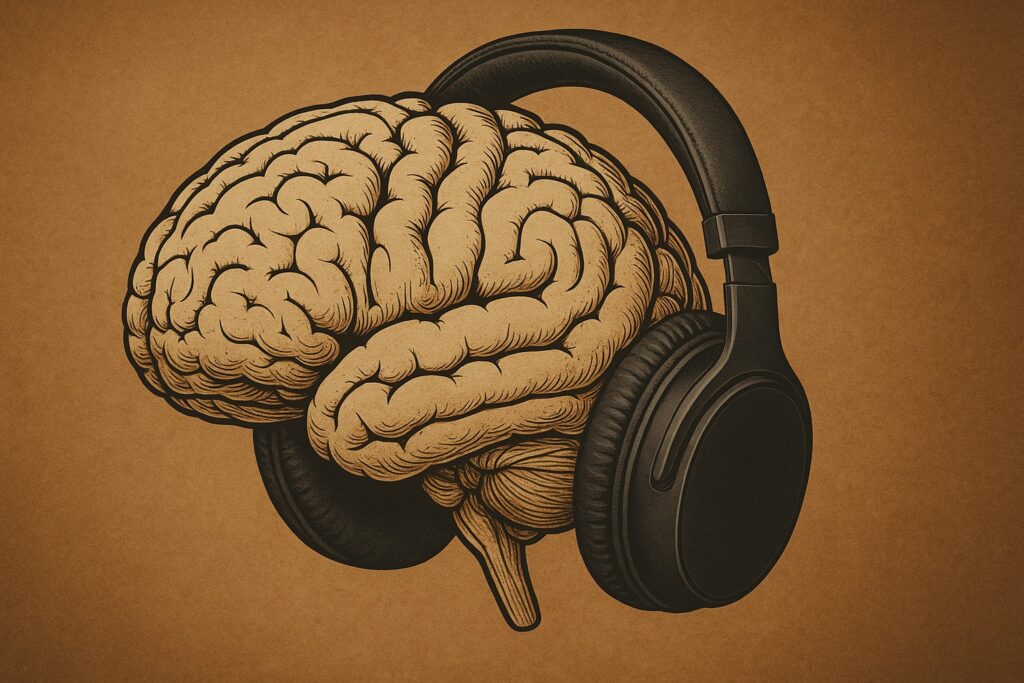How Music Affects the Brain: The Neuropsychology of Focus
In a world of constant distractions, where every second of attention is worth its weight in gold, the ability to concentrate is more than a skill — it’s a resource. Among the many tools to enhance focus, music holds a special place. But is it a true ally of the brain, or just a pleasant illusion of productivity? Let’s dive deeper — down to the level of neurons, emotions, and rhythms.
Music and the Brain: A Meeting of Structures
Music is not just a collection of sounds. It is a complex stream of sensory information processed by multiple brain regions at once. The auditory cortex deciphers the sounds; the frontal cortex analyzes structure and rhythm. The limbic system — the seat of emotion — reacts to harmony or dissonance, triggering emotional states that can either boost or hinder concentration.
This multilayered processing means that music can influence both cognitive and emotional aspects of brain function. However, the effect depends on the context, the task at hand, the nature of the music, and even the listener’s personal preferences.
The Role of Dopamine and the Reward System
One of the key mechanisms through which music works is by stimulating dopamine release — the neurotransmitter linked to motivation, pleasure, and focus. fMRI studies show that listening to favorite music activates the brain’s “reward system” — particularly the ventral tegmental area and the nucleus accumbens. As a result, the brain enters a state of heightened readiness and motivation.
This explains why a single familiar track can sometimes shift us into work mode. But overstimulation can also be counterproductive — emotionally intense or complex music may become a distraction rather than a support.
Types of Attention and Different Music Genres
Concentration is not a monolithic function. There are several types of attention — selective, divided, sustained — and various music genres affect them differently.
-
Lo-fi, ambient, classical instrumental music — promotes sustained attention, especially during routine or analytical tasks. These styles create a “sonic curtain” that masks background noise and helps maintain a mental rhythm.
-
Pop, rock, and music with lyrics — can stimulate or distract, depending on the content. For reading or writing tasks, lyrical music competes with the brain’s language centers.
-
Rhythmic electronic music (such as future garage) — supports tempo and may be helpful for physical or repetitive tasks like design or programming.
Individual Differences
What enhances one person’s productivity might derail another’s. People with high anxiety levels often respond better to calming music, while extroverts may require more stimulating soundscapes.
Brain training also plays a role. For example, professional musicians perceive composition differently — often focusing on technical details instead of overall sound. This can both aid and hinder concentration.
Emotions as a Factor in Focus
One cannot speak of concentration without addressing emotional state. Stress, anxiety, and sadness are the natural enemies of focus. And here, music emerges as a powerful emotional regulator.
Slow instrumental music can reduce heart rate, normalize breathing, and help the mind enter a state of “calm alertness.” This is an ideal ground for cognitive productivity.
Neuroplasticity and Habit
Over time, the brain adapts to repeated sound environments. If you consistently work to a particular type of music, it becomes a trigger for task engagement — much like a conditioned reflex.
Repeatedly using the same tracks for work or study builds neural associations that reduce the time needed to “drop in” to a focused state. But consistency is key — sudden changes in genre or volume can break this effect.
When Music Gets in the Way
Music is not a cure-all. It can be detrimental when:
-
It’s too loud
-
It contains lyrics (especially during language-based tasks)
-
It’s emotionally unstable or dramatic
-
It’s new and overly engaging (stimulates curiosity instead of focus)
Novelty, in particular, demands caution — the brain instinctively reacts to new stimuli, so unfamiliar music can hijack attention.
Conclusion: Music as a Tool, Not a Panacea
Music can be a powerful ally in cultivating focus — but only when chosen wisely, with an individualized and mindful approach. It is not a magic pill, but a subtle tool that must be tuned to your personal rhythm.
Our attention is like a river that easily shifts its course. Music can be the banks that guide its flow — or the flood that washes it away. The choice is ours.

